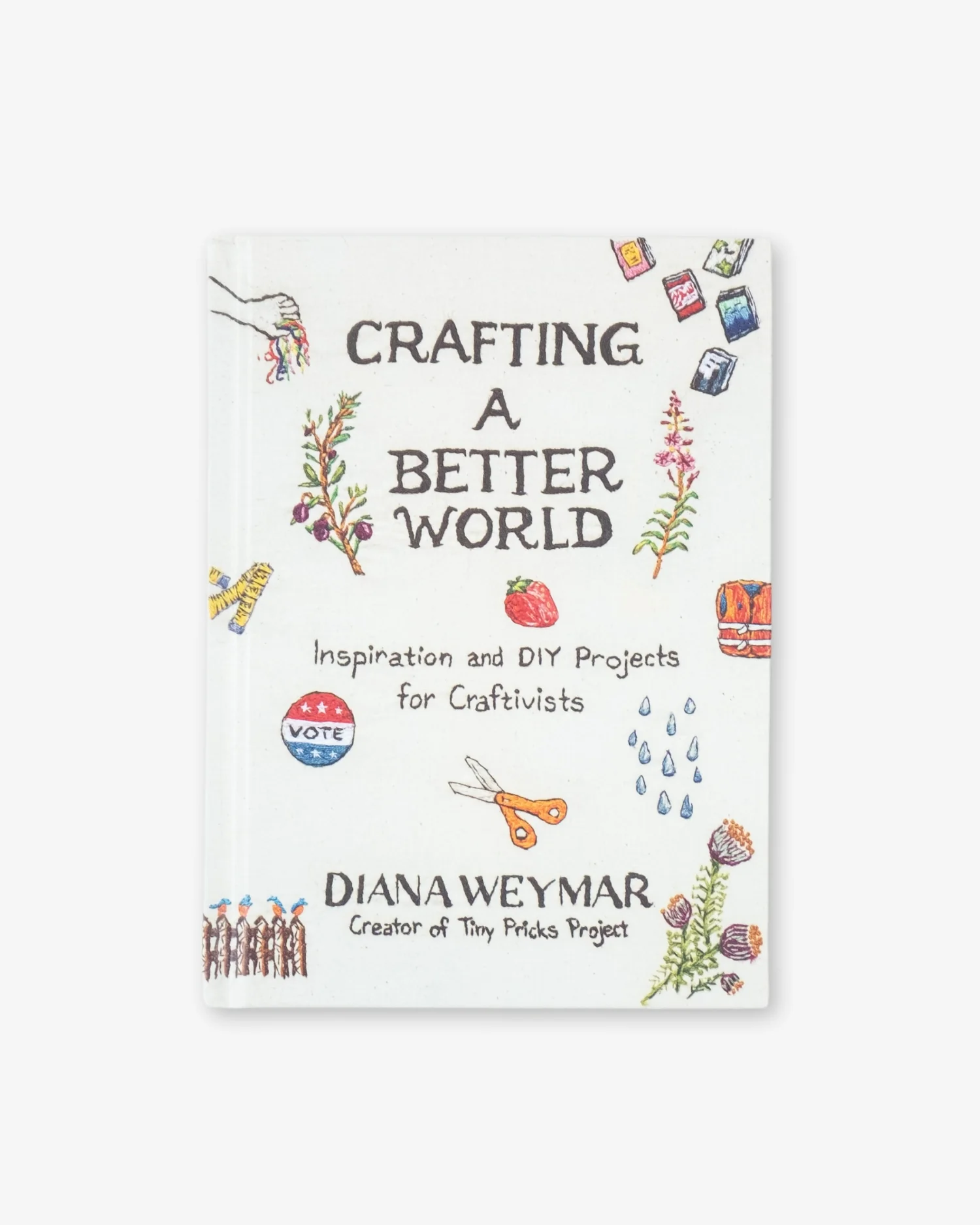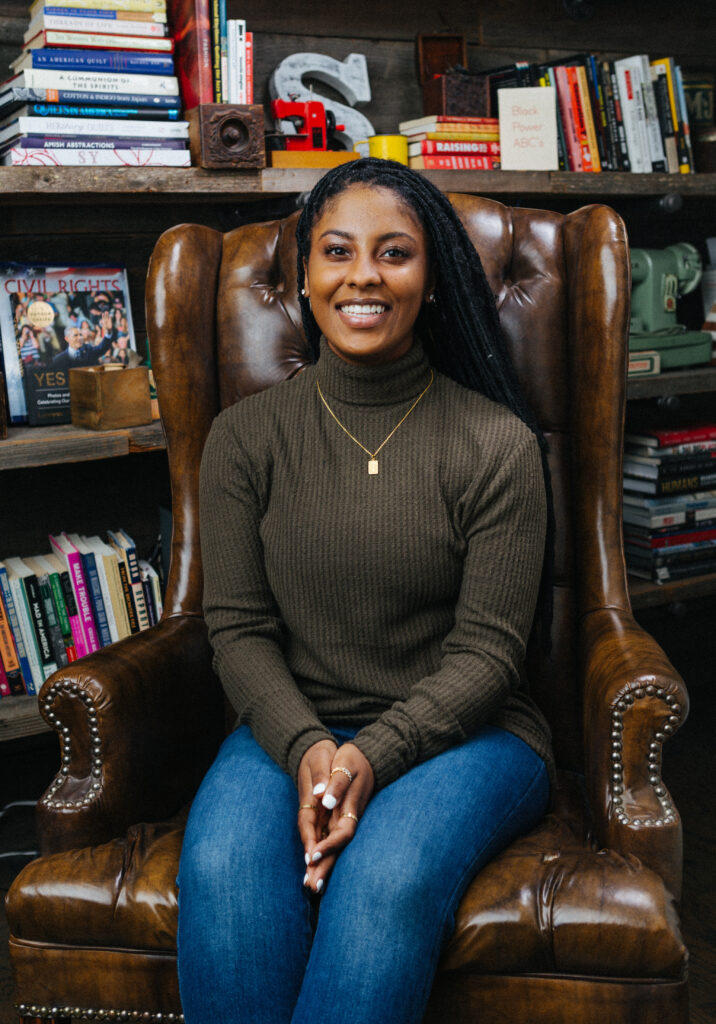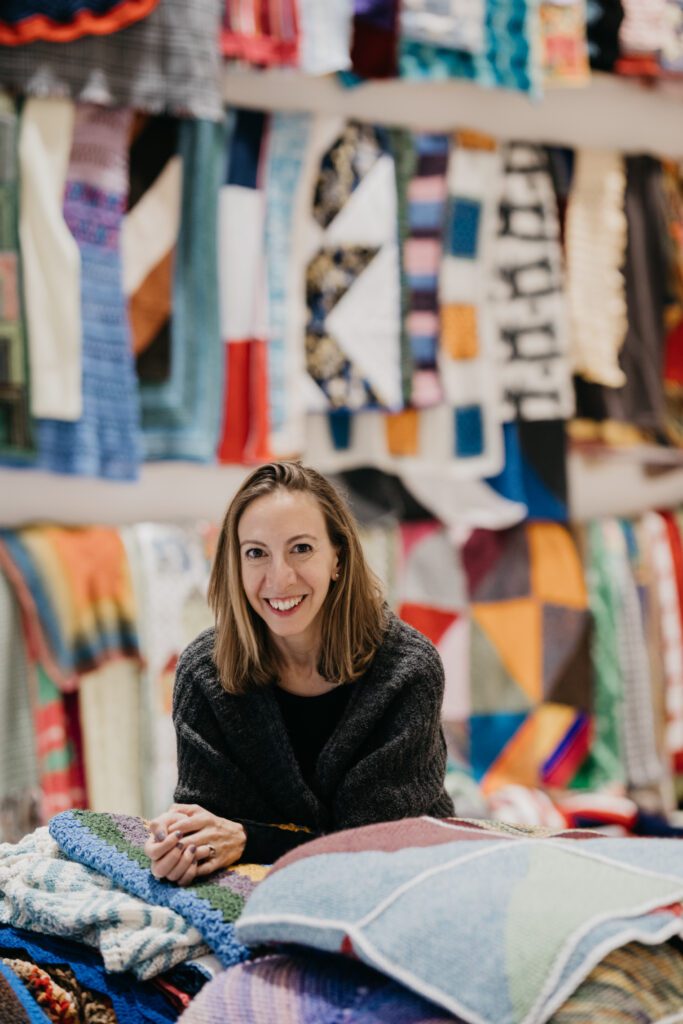
The Panel
In this dynamic panel discussion, three pioneering craftivists explore how handcraft and collective making have emerged as powerful forces for social change and community building. Diana Weymar, creator of the Tiny Pricks Project, Sara Trail, founder of the Social Justice Sewing Academy, and Jayna Zweiman, co-creator of the Pussyhat Project and founder of Welcome Blanket, will share their experiences in mobilizing makers to address pressing social and political issues through textile arts.
Drawing from their diverse backgrounds – from British Columbia’s wilderness to Harvard’s halls of academia to California’s activist communities – these leaders will discuss the evolution of craftivism in the digital age, examining how social media has transformed public participation and community engagement. They’ll delve into the challenges and opportunities of sustaining long-term activist movements through making, exploring how craft can serve as both a form of resistance and a means of preserving our political moment. The conversation will touch on crucial themes of accessibility, migration, youth empowerment, and the power of individual voices within collective movements, offering attendees insight into how craft can build bridges across generations and communities while catalyzing meaningful social change.
Meet the panelists

Diana Weymar grew up in the wilderness of British Columbia, studied Creative Writing at Princeton University, and worked in film in New York City. For the past decade, she has been threading the needle to create a material record of our times. Both on social media and in person, she has encouraged thousands of people to find their own creative path through personal and political challenges.
She is the creator and curator of the public art projects Interwoven Stories and Tiny Pricks Project. Her collaborations and exhibits bring people together around textile and embroidery to share personal stories and discuss political issues. She has worked or collaborated with Build Peace (Nicosia, Bogotá, Zurich, Belfast, San Diego), Arts Council of Princeton, Nantucket Atheneum, W.E.B. Du Bois Center at UMass Amherst, University of Puget Sound, Zen Hospice Project, Open Arts Space (Damascus Syria), Trans Tipping Point Project, New York Textile Month, Alison Cornyn’s Incorrigibles project, Syrian journalist and activist Mansour Omari, Princeton University Concerts Healing With Music program, Project Threadways, Alabama Chanin, Open Society Foundations, The Isolation Journals, Kate Bowler, Economic Hardship Reporting Project, Culture House, the Fetterman campaign, Speedwell Projects, ShowUp Gallery, Planthouse Gallery, Molly Jong-Fast, Lingua Franca, and Abortion Access Front, #notalonechallenge, and many others. Her work is also in private collections.

Sara Trail is a prominent craftivist, educator, and founder of the Social Justice Sewing Academy (SJSA), a nonprofit organization that empowers youth to use sewing and quilting as tools for social justice and activism. Born in California, Sara was a prodigy in the quilting world, learning to sew at a young age and publishing her first book, Sew With Sara, while still a teenager. She later attended UC Berkeley and Harvard focusing on how education and social justice intersect. Sara founded SJSA in 2017 with the mission to use textile art as a platform for young people, especially those from marginalized communities, to express their voices on issues like racism, gender inequality, police violence, and climate change. Through workshops and community quilting projects, participants create powerful quilt blocks that reflect their experiences and perspectives. These blocks are then transformed into larger quilts by volunteer quilters and displayed in exhibitions worldwide, sparking conversations about justice and equity. Trail’s work has brought her recognition as a leader in the craftivist movement, blending traditional crafts with modern activism. She is celebrated for her ability to inspire intergenerational collaboration and for giving a platform to underrepresented voices through art.

Jayna Zweiman is an award-winning designer, and social entrepreneur whose work bridges architecture, art, craft, and new media. Her practice explores civic intimacy, accessibility, soft power, and joy, creating experiences across physical, virtual, and conceptual spaces.
Jayna is the co-creator/founder of Pussyhat Project, a globally recognized craftivism movement that became an enduring symbol of women’s rights during the 2017 Women’s Marches. As one of the largest crowd-sourced art advocacy projects in history, Pussyhat Project demonstrates her ability to use design to catalyze social change, earning a place on the cover of Time magazine for its cultural impact.
Jayna also founded and runs Welcome Blanket (501c3), which combines craft and narrative to weave an American migration tapestry. Makers create blankets and share family migration stories that are exhibited before being gifted to newly arrived refugee neighbors. Through collective acts of making, exhibition, and programming, Welcome Blanket has fostered connection and care, resulting in the gifting of over 7,500 blankets and counting.
Jayna holds an AB in Visual Arts and Economics from Brown University and a Master of Architecture from the Harvard Graduate School of Design. Her work has been exhibited and collected internationally at institutions such as LACMA, the Victoria and Albert Museum, and the Smart Museum of Art. She lives and works in Los Angeles.
Date & Time
Thursday, April 17th, 2025
4:30-6:00pm ET
Location
Zoom, a link will be send to participants the day before each lecture
Recording
This panel will be recorded. A link to the recording will be emailed to all those who register following the live session. This link is live for one month for you to watch at your convenience.
Cost
Tickets for this event are sold on a sliding scale beginning at $10 with a suggested donation of $25, but if you wish to pay less or more than the suggested donation, you may select a different amount from the drop down menu.
You can purchase the book here, or select “purchase the book” from the drop down menu after adding your donation to cart.
As always, we are grateful for your support, which ensures the continuation and preservation of textile knowledge. Thank you for making this series possible.
Tatter Library is a registered 501(c)3. Our speaker series is part of our community programming and proceeds support the continued success of our talks with artists, scholars, and historians we admire.
**This session will be recorded. A link to the recording will be emailed to all those who register.
